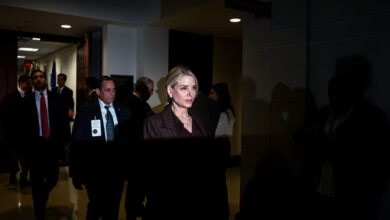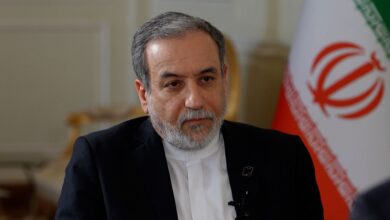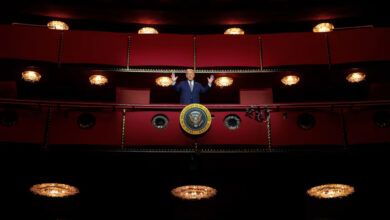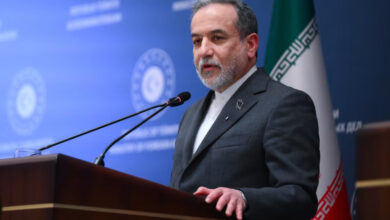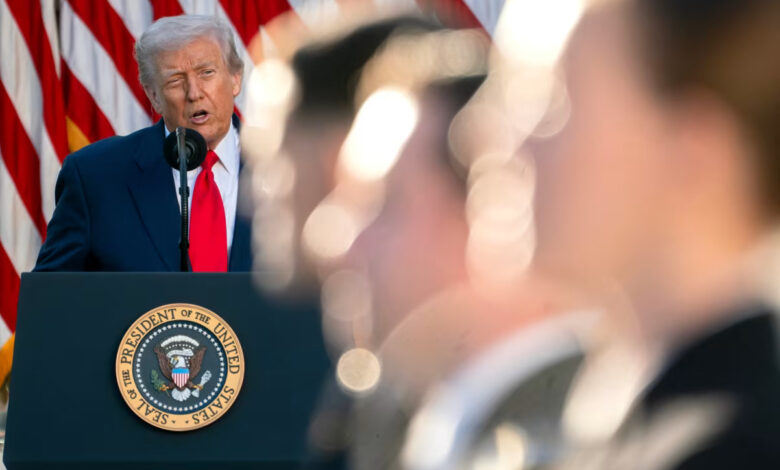
Donald Trump has his finger in an awful lot of global pies for a president who was supposed to put America first.
Trump on Tuesday threatened to disarm Hamas if it didn’t give up its weapons in Gaza, raising speculation about a US military role, and crowed about obliterating another speedboat off Venezuela in his legally dubious war against drug cartels.
In the middle of a US government shutdown that he claims forced him to fire hundreds of federal workers for lack of funds, he dangled a $20 billion economic bailout for Argentina — but only if voters there shore up his scandal-hit populist pal President Javier Milei.
Trump also publicly tossed around Ukraine’s desire for him to send Tomahawk cruise missiles that could strike deep inside Russia. This might risk the direct US clash with Moscow that he spent months warning against on the 2024 campaign trail. But the threat might repair his crumbled prestige after President Vladimir Putin has mocked his peace efforts.
Trump’s new zeal for global entanglements might surprise MAGA voters who thought the president meant to exclusively take care of business at home.
It’s often hard to trace a logical through line in Trump’s endless assaults on convention. And world leaders who are usually an afterthought when they brave the press alongside him frequently look mystified by his ramblings.
On Tuesday for example, Trump treated Milei to one of his classic weaves. In a pell-mell stream of consciousness, he lambasted “nasty, horrible” Democratic Sen. Elizabeth Warren and slammed the “communist” New York mayoral candidate Zohran Mamdani. He boasted about a $15 million settlement he received for his presidential library in a defamation settlement involving ABC’s George Stephanopoulos. He mocked former President Joe Biden’s use of an autopen; ridiculed ex-Vice President Kamala Harris; rebuked Spain for its low defense spending; and hyped the forthcoming World Cup and Olympics in Los Angeles.
A day before, Trump the statesman had been the toast of the world after brokering a stunning ceasefire and hostage return deal between Israel and Hamas. Yet here he was, back acting out festering grudges on live TV.
But amid the torrent of triviality, a coherent worldview emerged as Trump spoke about the Middle East, Venezuela, the Western Hemisphere and Ukraine, albeit in ways sharply at odds with traditional US foreign policy, MAGA expectations and sometimes US law.

Trump is no isolationist
One of the problems with Trump’s use of the phrase “America First” is that it conjures confusing associations with the far-right 1930s committee that opposed the entry of the United States into World War II and the fight against Nazism.
But it would be more accurate to describe Trump as an opponent of internationalism, rather than a prophet of isolationism. He increasingly relishes applying American power on the global stage. His allergy to ground wars like those in Iraq and Afghanistan, for instance, didn’t stop him launching punishing air strikes against Iran’s nuclear sites that made him look tough.
Trump often borrows from various strands of GOP national security ideology present within his administration. Sometimes he sides with hawks like Secretary of State Marco Rubio. At other times, he indulges in the anti-woke stunt politics of Defense Secretary Pete Hegseth. In his tariff wars, he’s going with anti-globalists like trade guru Peter Navarro. But his Middle East breakthrough mirrored the legacy of an ultra-traditionalist GOP Atlanticist, President George H.W. Bush.
The erratic Trump is impossible to pin down ideologically. And his imperious personality means his foreign policy is often no more complex than a feral desire to exert his own power over whoever is sitting opposite.
“Our plan will put America first. Americanism, not globalism, will be our credo. As long as we are led by politicians who will not put America first, then we can be assured that other nations will not treat America with respect,” Trump said at his 2016 Republican National Convention address in Cleveland.
He fleshed out his views in his first address to the UN General Assembly a year later, pledging the US would flex nation-state power rather than work through international institutions and traditional alliance structures. “As president of the United States, I will always put America first, just like you, as the leaders of your countries, will always, and should always, put your countries first,” he said.

In his second term, as he smashes constitutional and legal restraints at home, he’s added a new dimension to his foreign policy — seeking to secure personal prestige, his legacy, a Nobel Peace Prize and a place among the world’s most powerful strongmen.
Sometimes, it feels like “America First” has become Trump first.
The president also sees the world with a businessman’s eye, seeking deals and financial openings for the United States and sometimes for his family empire. His vision for Gaza is as much a development proposition as a humanitarian one. The driving force behind some of Trump’s over-hyped claims to have ended many wars — some that weren’t even raging — is economic advantage and access to key minerals and rare earth metals over which China currently has a stranglehold.
At the same time, Trump and his Vice President JD Vance strive to promote global populism, even at the cost of undermining centrist governments, like those in Britain, France and Germany, whose leaders he likes.
How Trump’s policies fit into his unique blueprint
The official explanation for Trump’s bailout offer to Argentina is that its reeling economy poses a risk of contagion that could rock South America and even spread to the United States. This might be true. But Trump and Treasury Secretary Scott Bessent made no attempt Tuesday to hide the real motivation: to give a leg up to a right-wing ally who wrote the blueprint for the conflagration the president ignited under the federal bureaucracy and who appeared on stage early this year with former DOGE chief Elon Musk and a chainsaw.
“He’s MAGA all the way. It’s ‘Make Argentina Great Again’,” Trump as he hosted Milei at the White House. The Argentine leader is also a past Mar-a-Lago guest.
“If he wins, we’re staying with him,” Trump said. “And if he doesn’t win, we’re gone.”

In normal times, Trump’s flaunting of billions of dollars in US taxpayer money to effectively try to bribe voters in Argentina’s midterm elections in blatant interference in a foreign country’s election would trigger a major scandal. It’s reminiscent of Trump’s threat to make military aid to Ukraine contingent on it opening an investigation into Biden, which got him impeached.
But when everything is an outrage, nothing is.
Trump was forced to confront the apparent contradiction between the MAGA philosophy and bailing out a foreign nation when a reporter asked in the meeting with Milei, “How is this Argentina rescue package ‘America First’?” His waffling answer didn’t really identify any other reason than offering a political favor.
But the Argentina initiative does play into a broader Trump priority — a global great game for influence, economic primacy and power against China, which has been vying with the US to get access to Argentine lithium and copper and recently undercut US farmers by buying Argentinian soybeans.
That desire to reshape the politics of the Western Hemisphere — much as Trump is trying to transform the Middle East — is also partly behind unilateral US military attacks on alleged cartel targets off Venezuela.
The one-sided application of vast military force is faithful to one MAGA principle: the attempt to crack down on the trafficking of fentanyl, which has killed thousands of Americans, an issue that helped Trump bond with working-class voters. But the campaign — which US critics argue amounts to extra-judicial killings that flout the authority of Congress to declare war — looks increasingly like a hard-power geopolitical play to destabilize the government of President Nicolás Maduro. Venezuela’s economic crisis and repression sent huge migrant flows to the US.
Trump’s triumph in returning the Israeli hostages and ending the fighting in Gaza is a more traditional US foreign policy win than most of his international ventures. After all, US presidents have been mediating the Israel-Palestinian conflict, mostly unsuccessfully, for decades.
But the venture could clash with MAGA principles if US troops get drawn into Gaza. Trump warned Tuesday that if Hamas didn’t lay down its arms “we will disarm them.” He didn’t say how. But until the establishment of an international security force for the strip promised in his 20-point peace plan, his comment will raise speculation about a deeper role than the coordination and logistical mission some US personnel are expected to conduct in Israel. US involvement would conjure concerns among Trump supporters over the possible Middle East quagmires that helped to nurture his political movement in the first place.
“Everything is possible with (Trump),” said Andrew Miller, a former deputy assistant secretary of state for Israeli Palestinian affairs in the Biden administration.
“But one of the central planks that he’s run on since he emerged on the scene has been staying out of Middle East wars,” Miller said on “CNN News Central.” “If we do wind up in in a scenario with a major US military contingent in Gaza, of all places, I think that’s going to test his support from his base.”

